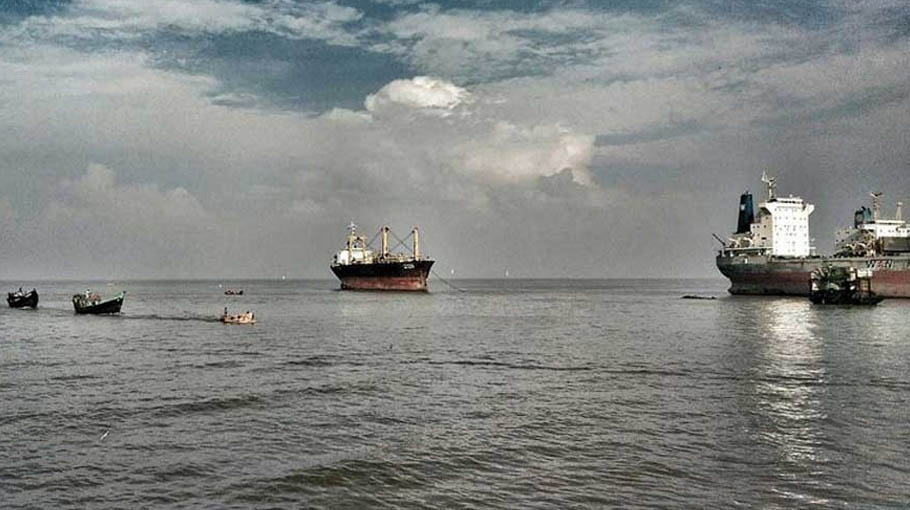Tapping the potentials of blue economy

Blue economy is described as the long-term utilization of ocean resources for economic or financial growth, improvised livelihoods, and job creation while maintaining the health of the ocean environment.
According to sources, maritime disputes with neighbouring Myanmar and India were settled in 2012 and 2014. Bangladesh gained ownership over 1 lakh 17 thousand 613 sq km of the Bay of Bengal, comprising special economic zones and continental shelf. Shallow continents and oceans account for 20% and 35%, respectively. The remaining 45% is the deep sea.
Recently Bangladesh and Portugal connected the two countries via direct shipping links to create new perspectives for fast, cheap and reliable shipping. At the same time, Bangladesh exporters regularly ship to Europe by sea. Emphasizing the government's investment-friendly policies and incentives, the Minister of State called for the best use of the opportunities offered to Portuguese investors to invest in Bangladesh
The challenges identified in the plan are lack of investment and the inadequate role of the private sector. Transforming the blue economy will require fundamental and overall changes in the policies, controls, rules, management, administrative structures or structures of these functions. According to the organization General Economics Department (GED), Bangladesh has enormous potential in the sea, which helps expand international trade and commerce. The disputed area along the maritime border with Myanmar is now considered a 'new area of development' for the country. These strategies and challenges are highlighted in the Bangladesh Perspective Plan (2021-41). The long-term plan has recently been officially unveiled.
The plan has been reviewed, and the strategy is to build a robust policy framework to harness the potential of the blue economy. A task force consisting of local and international experts will be formed to carry out this work. The draft policy framework, titled 'Policy for Maritime and Coastal Development', will be submitted to the Cabinet.
Apart from this, most of the investment in the development of the blue economy will have to come from the private sector. Appropriate incentives and regulatory policies will be adopted to increase private investment in the blue economy. The role of FDI (FDI) will be expanded to bring in new knowledge, technology and investment.
The highest priority will be to build a monitoring, surveillance and control system for the enormous fleets of hereditary boats fishing in the sea. The cost-effective and hassle-free registration and collection of permits will be simplified. According to experts, fish alone has 500 types, in addition to snails, shellfish, crabs, sharks, octopuses, and other species. Bangladesh is predicted to catch just 0.70 million tons of fish every year, out of 8 million tons in the Bay of Bengal. According to experts, Bangladesh may harvest minerals worth around $1.2 billion from the water.
Prime Minister Sheikh Hasina confirmed that her government has been taking necessary actions to influence the possibilities of the blue economy to accelerate the country's growth and they are out to achieve the SDG-14 (Conserve and sustainably use the oceans, seas and marine resources for sustainable development). The plan further states that a two-pronged strategy will address the lack of quantitative concepts and knowledge of marine resources. With the technical assistance of the Navy and Engineering Universities in the country, the capacity to conduct sea surveys will be increased.
In the international arena, technical assistance will be sought from the countries concerned. In addition, knowledge and resources will be mobilized through regional and international cooperation. Ongoing initiatives with India, China and the European Union to facilitate research and joint ventures related to the blue economy will be accelerated. Ensuring sustainable use of marine resources will be given top priority.
According to the experts, Bangladesh should expedite its efforts to capitalize on the enormous potential of the 'Blue Economy' to achieve double-digit GDP growth, as its marine region is rich in valuable natural resources, both living and non-living. They stated that the enormous marine region contributes just $9.6 billion or 6% of the Bangladesh GDP yearly, but it has the potential to contribute more if the resources are adequately used.
Coastal tourism should be facilitated, for example, through tourism campaigns, establishing joint coastal tourism programs with neighbouring countries, investing in tour operators and operators and providing tax incentives, and developing year-round tourism vessels. Other issues include conserving mangroves and sea grass, addressing climate change and controlling carbon emissions, preventing sea-level rise and changes in ecosystems and temperatures, addressing ocean acidification and blue carbon, and keeping the sea region free of pollution and marine debris.
Other strategies focus on conserving biodiversity under the contextual plan to ensure long-term fish availability. Several steps will be taken in this regard, e.g. prohibition from fishing during the breeding season, establishing marine protected areas similar to the declared area around the swatch of no ground, etc. The coastal tourism industry will be developed by adopting several measures. In addition, steps will be taken to add to the potential of the blue economy as a source of energy through exploration of remote sea areas.
Skilled workers such as engineers, navigators, merchants, fisheries experts, bioengineers, and marine resource investigators are available at private and public maritime academies to meet increasing demands and opportunities for coastal and offshore work.
Indeed, the government is already moving to improvise in the Maritime Sector. Several new institutions have been established In the past decade, such as Bangabandhu Sheikh Mujibur Rahman Maritime University, Dhaka (founded in 2013), Bangladesh Ocean Research Institute (BORI), Cox's Bazar (established in 2013), and Bangladesh Marine Research Institute. and Development (BIMRAD), Dhaka (2018), as well as oceanography or related departments in several general and specialized universities.
However, Bangladesh has only surveyed several sectors of the blue economy, including aquaculture, shipbuilding, ship breaking, salt making and port facilities. Also, most of these sectors trail outdated methods. Therefore, there are many opportunities for exploration of numerous blue economy sectors, mangrove and seagrass protection, environmental change management and carbon emission management, and further development to contribute to sustainable development.
There are also challenges in adopting innovative technologies aim.
Sheikh Mehbuba Moitree is a student of LL.B (Honours) in Maritime Law & Policy of Bangabandhu Sheikh Mujibur Rahman Maritime University



